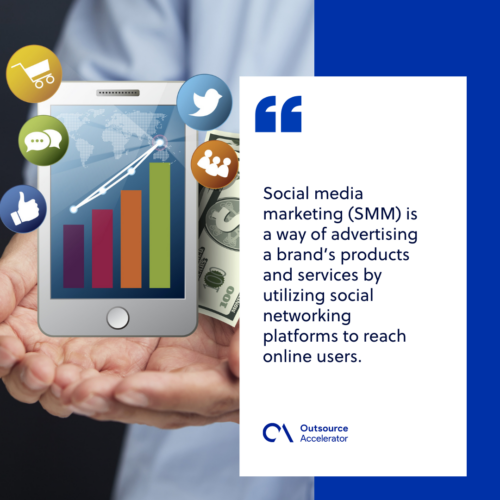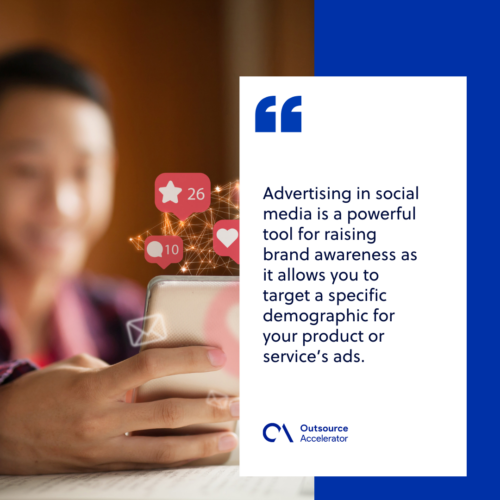Social media marketing (SMM)
Definition
What is social media marketing?
Social media marketing (SMM) is a way of advertising a brand’s products and services by utilizing social networking platforms to reach online users.
SMM is a marketing strategy that relies on user engagement with a website or webpage’s content. It is a relatively new avenue for marketers to engage with their existing customer base while simultaneously reaching out to potential new customers.
SMM is not just creating a profile for a business or company and creating content when the urge arises; instead, SMM involves proactively posting images, videos, etc., and making content that reflects the business or brand and hooks its intended audience.

A brief history of social media marketing
Although SMM’s emergence can’t be traced back to a specific date, the “dot-com bubble” of 1995-2002 is regarded as the event that heralded the viability of the internet as an effective tool in marketing.
As internet search engines like Google and Yahoo evolved, companies began using search engine optimization (SEO) strategies to stay on top of search engine result pages (SERPs).
The internet’s marketing utility became even more pronounced with the emergence of Web 2.0 and the rise of blog sites. This eventually led to a shift from outbound marketing strategies to inbound marketing.
With the emergence of social networking sites, such as Facebook, Myspace, and LinkedIn in 2003-2004, businesses realized the advantages of social media presence for them. Eventually, firms and companies began creating their own profiles on popular social networking platforms.
5 pillars of social media marketing
There are five pillars that you should consider before diving into SMM: strategy, planning and publishing, listening and engagement, analytics and reporting, and advertising.
Strategy
Under the pillar of strategy is taking a step back and looking at the broader picture. Asking yourself the following questions helps in coming up with your social media strategy:
- What are the goals and objectives of your business?
- Which social networking platforms do you plan to utilize?
- What types of content do you intend to share with your audience?
Planning and publishing
This pillar of SMM pertains to organizing the things to post on your brand’s social media profile and when you should post them. Rather than randomly posting content, you should have a laid-out plan of posts.
Knowing the right time to post the right content is also crucial in planning your SMM strategy. Creating a content calendar and using content management systems help manage and keep track of your content on social media.
Listening and engagement
This third pillar of SMM will become more relevant as your brand’s social media profile grows. As your social media presence increases, you will have more people interacting with your content.
People are also more likely to share and comment on your posts or tag your brand on theirs. This is where listening and engagement come into play.
With a growing social media presence, you will want to keep abreast of where your brand is mentioned and keep your audience engaged.
Manually checking where your brand appears on social media is time-consuming. Fortunately, there are online tools that can help you listen and engage with your online audience.
Analytics and reporting
Listening and engaging with your audience only go so far. This is why the fourth pillar of SMM is analytics and reporting.
In analytics and reporting, you would be monitoring the online engagement and reach. Knowing these would also let you know which posts did not do well and the factors that might have affected them, such as the time of posting, the platform on which they were posted, and their content.
As with the other pillars, there are social media analytics tools that can do the analytics and reporting work for you.
Advertising
The last pillar is paid advertisement. With paid advertising, you will be able to reach out to an even wider audience than your current following.
Advertising in social media is a powerful tool for raising brand awareness as it allows you to target a specific demographic for your product or service’s ads.

Advantages of SMM
With the prevalence of social networking and various user platforms today, SMM has become a handy tool for marketers.
Below are some of the advantages of using SMM:
Humanize your brand
Creating a social media profile for your brand and using it to interact with your audience gives it a more approachable persona. This allows your audience to connect with and relate to your brand.
Boost traffic
Having a social media profile for a business or company can drive traffic to your brand’s website.
Create leads and convert customers
A social media profile for your brand can help you generate leads and convert potential customers by using social media features such as Facebook’s shop or adding call-to-action buttons on your brand’s profile.
Raise brand awareness
Social media platforms’ highly visual nature is conducive to building your brand’s visual identity across several demographics. In turn, an increase in brand awareness ensures better outcomes for your other brand campaigns.
Social media platforms: Where to advertise
The various social media platforms available today present a myriad of marketing opportunities for businesses.
From LinkedIn, Facebook, and Instagram to Twitter, YouTube, and even TikTok, businesses now have easy access to multiple platforms to market their services.
Regardless of which social media platform they use, companies can develop online marketing strategies that can help increase their online presence.
Even small businesses can leverage social media networks and grow their brand identity there. Social media provides a relatively fair marketing battleground for SMEs with effective social media marketing teams and an established target market.
Below are some of the most popular social media platforms for businesses and a snippet of how they can use them.
LinkedIn is the ideal social media platform for connecting with entrepreneurs and business entities. Companies can create engaging content about their products and services and how they can help other businesses.
Because almost everyone on this platform is actively hiring, looking for work, or currently employed, it is one of the best social media channels to generate leads and grow your market.
Almost everyone and their mother has a Facebook account they use regularly. This presents two marketing opportunities for businesses.
One, they can run paid ads on the platform, and two, they can bank on this social media platform’s popularity and grow their business’s own following on Facebook.
Most social media platforms are great places for churning out user-generated content (UGC). However, Facebook’s massive user population makes it one of the richest sources of user-generated content.
Brands can also keep their target market engaged through regular interaction and the publishing of relevant content.
Instagram, or IG, is the perfect social media marketing platform for businesses in the travel industry and other sectors that rely on photo media.
Social media marketers can generate leads by posting photos of their services. For travel companies, these are usually facilities and vacation spots where they can take customers. For other businesses (e.g., graphic design), these are finished products and previous projects.
YouTube
YouTube is a great platform for companies with an established and active audience. Marketers can publish shareable videos on this platform, which their audience can share on other social media channels.
Twitter is another popular platform for businesses that want to have a more active presence on social media. Companies with Twitter profiles can give a more personalized touch to their audience engagement, as frequently shown by the fast-food giant Wendy’s.
Twitter provides the perfect outlet for executing a social media marketing campaign to establish your brand identity and voice on social media.
Social media strategy: How to make it work
Social media marketing – or even social media advertising – should never be done with a spray-and-pray approach.
There is an art to crafting an effective social media strategy for businesses. From meticulously curated social media posts to the analytical selection of your target audience, there are steps that companies can take to have an effective social media marketing strategy.
These steps are:
- Identify your target customers
- Define your goals and KPIs
- Allocate marketing resources wisely
- Use multiple platforms
- Post relevant and engaging content regularly
- Interact with your followers
- Always maintain professionalism
- Reflect on your brand identity
- Prioritize content quality over quantity
- Utilize social media analytics







 Independent
Independent




